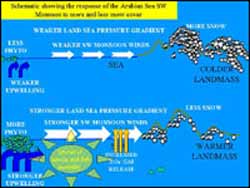A new ESA study predicts that the devastating Sumatran earthquake, which resulted in the tragic tsunami of 28 December 2004, will have left a ‘scar’ on Earth’s gravity that could be detected by a sensitive new satellite, due for launch next year.
The Sumatran earthquake measured 9 on the Richter scale and caused widespread devastation and death when it struck unexpectedly late last year. Thankfully, earthquakes of this magnitude are rare events, taking place perhaps once every tw

A NASA funded study has found a decline in winter and spring snow cover over Southwest Asia and the Himalayan mountain range is creating conditions for more widespread blooms of ocean plants in the Arabian Sea.
The decrease in snow cover has led to greater differences in both temperature and pressure systems between the Indian subcontinent and the Arabian Sea. The pressure differences generate monsoon winds that mix the ocean water in the Western Arabian Sea. This mixing leads to
Global warming link remains elusive
The first comprehensive study of glaciers on Antarctic Peninsula has uncovered widespread glacier retreat and suggests that recent climate change on the peninsula is responsible. Eighty-seven percent of the 244 marine glaciers have retreated over the last 50 years, a new study says. The widespread glacier retreat began at the northern, warmer tip of the Antarctic Peninsula. As atmospheric temperatures rose along the peninsula — more than 2.5 de
Instead of sequencing the genome of one organism, why not sequence a drop of sea water, a gram of farm soil or even a sunken whale skeleton? Scientists at the European Molecular Biology Laboratory (EMBL) in Heidelberg and their US collaborators have done just that, and the result is a new appreciation for the rich diversity of life that exists in the most unlikely places (Science, April 22, 2005).
Bacteria make up the greatest mass of life on earth by far and play a crucial role
Groundbreaking research led by the U.S. Department of Energy Joint Genome Institute (DOE JGI) demonstrates for the first time that the signatures of the genes alone in terrestrial and aquatic samples can accurately diagnose the health of the sampled environments. This study, published in the April 22nd edition of the journal Science positions large-scale genome sequencing to accelerate advances in environmental sciences akin to the contributions DNA sequencing has made to biomedical sciences.
Virus-host interactions at sea: The third age of phage
Cyanobacteria exert a disproportionate influence on their planet for their size. The Prochlorococcus group of cyanobacteria account for a large fraction of global photosynthesis by virtue of their ubiquitous presence in nutrient-depleted ocean waters. Even tinier agents – the viruses that infect these bacteria, called cyanophages – appear capable of wielding surprising influence on global cycles by affecting the populatio